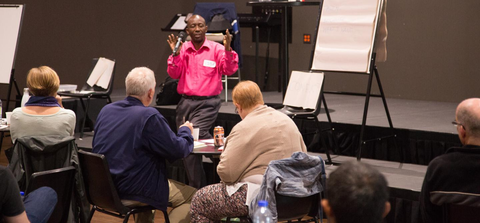A surprising turn of events brought Grebel Master of Peace and Conflict Studies (MPACS) student Bethany Serengheu (MPACS 2022) together to work with Zambia-based alumnus Issa Ebombolo (MPACS 2017) on a Peace Club curriculum for The Meeting House church based in Oakville, Ontario.
 Issa Ebombolo leads a Conflict Resolution workshop in Oakville in Ontario for 40 volunteers from 12 different Meeting House Church sites around Ontario. Photographer: Matt Thompson.
Issa Ebombolo leads a Conflict Resolution workshop in Oakville in Ontario for 40 volunteers from 12 different Meeting House Church sites around Ontario. Photographer: Matt Thompson.
Issa currently works with Mennonite Central Committee (MCC) Zambia and Malawi as a Peacebuilding Coordinator. In 2006, Issa developed Peace Club to foster a culture of peace to reduce violence and welcome forgiveness. The curriculum was originally developed for children in schools in Zambia. “I assist Zambia Correctional Service to implement Peace Club in prisons to create a culture of peace in cells and victim offender programs to restore relationships between offenders and victims,” explained Issa. “We assist victims to choose forgiveness instead of revenge and help offenders to repent as an essential step in the path towards reconciliation.”
Recently, Issa partnered with The Meeting House church to tailor his original Peace Club curriculum and adapt it for a Canadian church audience. “Canada is a multi-racial and ethnic country and therefore these neighbours come from conflict countries, diverse backgrounds, and they come with baggage and issues,” said Issa in an interview with MCC Canada. “They don’t leave those issues behind. It’s different, and people need to learn ways and means to handle these differences. This is why Peace Clubs are needed in Canada.”
For her MPACS internship, Bethany worked at The Meeting House as a Way of Peace Developer to reconstruct Issa’s curriculum to fit Canada’s church audience. “I wanted to bring the theories and skills I was learning in MPACS into a faith-based organization that has a strong focus on peace,” she said. “In my research for MPACS, I had been exploring the role of spirituality and religion in conflict transformation and peacebuilding, and I was curious to see how the Anabaptist tradition in a contemporary context was approaching peace.”
 According to Bethany, there were two main objectives for redeveloping the curriculum. “The first was to add a theological arc to the curriculum that better reflected the belief of The Meeting House,” she explained. “The other objective was to make the curriculum more contextually relevant for The Meeting House members. New videos were created, while older videos were kept for continuity and connection with the original excellent work done by Issa and others in Zambia.”
According to Bethany, there were two main objectives for redeveloping the curriculum. “The first was to add a theological arc to the curriculum that better reflected the belief of The Meeting House,” she explained. “The other objective was to make the curriculum more contextually relevant for The Meeting House members. New videos were created, while older videos were kept for continuity and connection with the original excellent work done by Issa and others in Zambia.”
The MPACS program at Grebel allowed both Issa and Bethany to deepen and refine tools to address conflict and explore reconciliation and forgiveness. “Grebel empowered me with the skills and knowledge of peace and conflict studies,” reported Issa. “The knowledge I acquired during my master’s degree program had a ripple effect in my work, it has been a milestone in changing the lives of many individuals, families, church communities, and government institutions.”
“My involvement has helped me to grow in the effort of creating human security and making this world a better place to live,” he added. “It gives me joy, satisfaction, and fulfillment when I see people choosing the path of peace instead of violence.”






